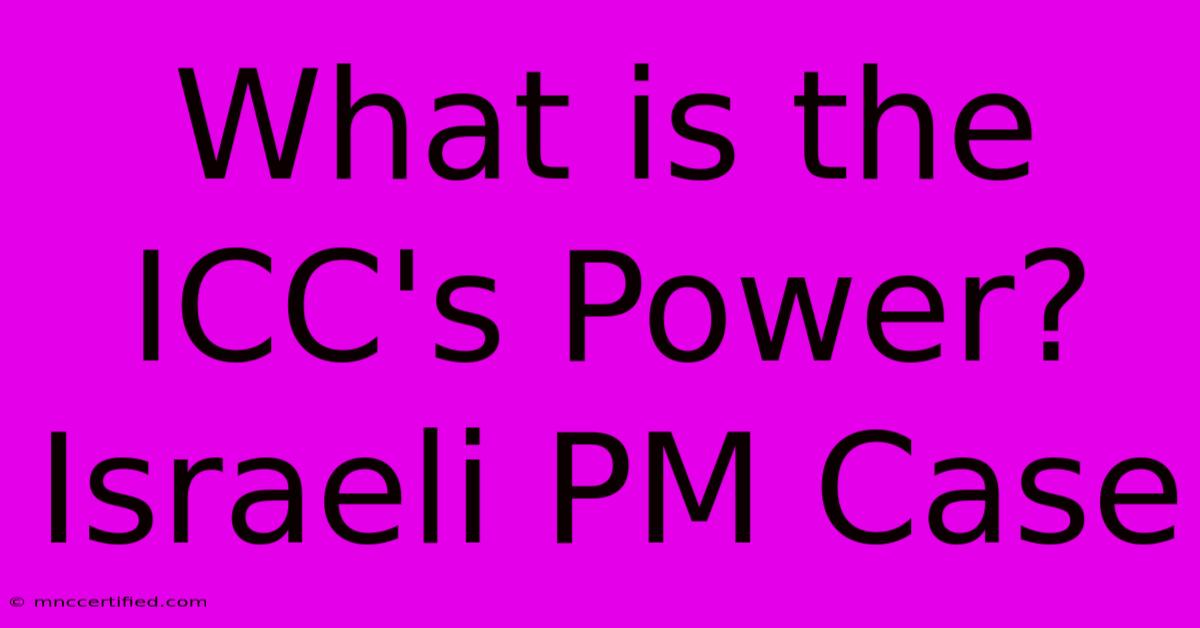What Is The ICC's Power? Israeli PM Case

Table of Contents
What is the ICC's Power? Examining the Israeli Prime Minister Case and its Implications
The International Criminal Court (ICC) recently authorized an investigation into alleged war crimes committed in Palestinian territories. This has ignited a fierce debate, particularly concerning the ICC's power and its potential impact on the Israeli Prime Minister and Israeli policies. Understanding the ICC's jurisdiction, limitations, and the complexities of the Israeli case is crucial for navigating this controversial issue.
Understanding the ICC's Jurisdiction and Powers
The ICC is an independent, permanent court established to prosecute individuals for the most serious international crimes, including genocide, war crimes, crimes against humanity, and the crime of aggression. Its power stems from the Rome Statute, the treaty that established the court. However, the ICC's jurisdiction isn't unlimited. It relies on several key factors:
- State Party Referral: A state party to the Rome Statute can refer a situation to the ICC for investigation. Palestine is a state party.
- Security Council Referral: The UN Security Council can refer a situation, even if the state involved isn't a member of the Rome Statute. This is a significant avenue, although it's politically charged and often subject to vetoes.
- Prosecutor's Own Motion (Proprio Motu): The ICC Prosecutor can initiate an investigation if they deem there's sufficient evidence of crimes within the court's jurisdiction and the situation isn't being adequately investigated nationally. This power is often exercised when states are unwilling or unable to prosecute.
Limitations on ICC Power:
It's crucial to understand the ICC's limitations:
- No Enforcement Power: The ICC lacks its own army or police force. It relies on states to cooperate in arresting and surrendering suspects. This can be a significant obstacle, especially when dealing with powerful nations.
- Geographical Limitations: The ICC's jurisdiction is limited to situations occurring within the territory of a state party or involving a national of a state party. The precise geographical scope of the Palestine case remains a point of contention.
- Political Influence: Despite its intended independence, the ICC remains susceptible to political pressures and influences. The decisions made by the court can face considerable international scrutiny and pushback.
The Israeli Prime Minister Case and its Implications
The ICC's investigation into alleged war crimes in Palestinian territories includes scrutiny of actions by Israeli officials, potentially impacting the Israeli Prime Minister. The investigation's focus includes alleged violations of international humanitarian law and human rights law. The potential consequences for individuals found guilty are severe, ranging from imprisonment to financial penalties.
However, the investigation is not solely about the Prime Minister. It encompasses a broader range of allegations regarding Israeli military actions and policies in the occupied territories. The outcome of the investigation remains uncertain, and the process could take years.
Key Controversies and Challenges:
- Statehood Recognition: Israel disputes Palestine's statehood, arguing that the ICC lacks jurisdiction over events in the occupied territories. This is a central legal challenge in the case.
- Bias Accusations: Critics allege a bias against Israel within the ICC, pointing to the disproportionate number of investigations targeting the country. These accusations highlight the political complexities surrounding the court's actions.
- International Relations: The ICC's investigation has significantly strained relations between Israel and the international community, raising concerns about geopolitical stability.
Conclusion: The ICC and its Future Role
The ICC's power is significant, yet constrained. The Israeli Prime Minister case underscores the complexities and limitations of international justice. The long-term implications of the investigation are far-reaching, impacting not only the individuals involved but also international relations and the debate about the court's role in maintaining international peace and security. The ongoing investigation will continue to shape the discourse on international law, accountability, and the pursuit of justice in conflict zones. Further, close monitoring of the legal proceedings and their impact on global politics will be crucial.

Thank you for visiting our website wich cover about What Is The ICC's Power? Israeli PM Case. We hope the information provided has been useful to you. Feel free to contact us if you have any questions or need further assistance. See you next time and dont miss to bookmark.
Featured Posts
-
False Insurance Claim Against Me
Nov 22, 2024
-
I M A Celebrity New Arrivals Twist
Nov 22, 2024
-
Trading Card Stores In San Diego
Nov 22, 2024
-
Can You Get Car Insurance Refund
Nov 22, 2024
-
Linda Nolan On Coleens Biggest Mistake
Nov 22, 2024